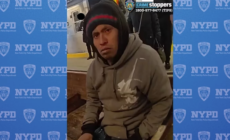-
How Airlines Pick the Movies on Your Flights - 23 mins ago
-
Two injured in crash of small plane on Carson golf course - 33 mins ago
-
Mets Could Lose $152 Million Pete Alonso To Dark Horse Rangers - 37 mins ago
-
Campus Groups Try to Make Room for Middle-Ground Opinions on the Middle East - about 1 hour ago
-
Padres, Rays Fan Favorite Wil Myers Announces Sudden Retirement At 34 - about 1 hour ago
-
Suspect Caught After Setting Sleeping Woman Ablaze on NYC Subway - 2 hours ago
-
They Made Over $100,000 in Overtime. Now the N.Y.P.D. Is Cracking Down. - 2 hours ago
-
Bubba Wallace Reacts To Unexpected Support From Commanders’ QB Jayden Daniels - 2 hours ago
-
R.F.K. Jr. Wants to Overhaul the F.D.A. How Would Scientists Change It? - 3 hours ago
-
Alex Caruso Signs Blockbuster Extension to Stay with Thunder - 3 hours ago
Californians broadly support Prop. 36 to get tougher on crime, poll shows
SACRAMENTO —
A solid majority of likely California voters support Proposition 36, the November ballot measure that would impose stricter penalties for retail theft and crimes involving fentanyl, according to a new UC Berkeley Institute of Governmental Studies poll co-sponsored by The Times.
Imposing harsher punishment on repeat offenders drove that support, far outweighing voters’ desire to increase overall prosecutions or deter future crime, the survey found.
Nearly half of those surveyed, however, support rehabilitation and treatment for first-time offenders among other options as the best way to improve California’s criminal justice system. Voters were almost evenly split over whether Proposition 36 would reduce homelessness or drug addiction in California, one of the selling points of the measures’ proponents.
“Voters are intent on passing this initiative,” said Mark DiCamillo, director of the Berkeley IGS Poll, a nonpartisan survey of California public opinion. “The reasons, I think, are interesting.”
The Berkeley poll also found support slipping for an initiative to increase California’s minimum wage which, along with Proposition 36, is among the 10 statewide measures on California’s November ballot. Support also remained tepid for the ballot measure that would expand the local government’s authority to enact rent control.
The Homelessness, Drug Addiction and Theft Reduction Act, known as Proposition 36, would impose stricter sentences for repetitive theft and offenses involving the deadly drug fentanyl. The nonpartisan legislative analyst’s office projected the initiative could cost the state upwards of hundreds of millions of dollars annually.
The measure is strongly backed by a group of California prosecutors and large retailers, including Walmart, and aims to overhaul parts of Proposition 47, a measure approved by voters in 2014 that reduced certain drug and property crime penalties.
Before Proposition 47 passed, some thefts could be considered felonies if the merchandise stolen was valued at $450 or more, but Proposition 47 raised the threshold to $950. Law enforcement organizations and others have criticized those changes, saying the reduced punishment has led to an increase in thefts and other lawlessness across California.
Gov. Gavin Newsom and California’s Democratic legislative leadership oppose Proposition 36, fearing it would return the state to tough-on-crime policies of the past that led to state prisons being so overcrowded that the federal courts ruled the state was violating the constitutional rights of inmates. DiCamillo said the leaders’ warnings haven’t swayed voters thus far.
“There are things voters have on their minds that apparently the politicians have underestimated,” DiCamilo said.
Sixty percent of likely voters supported Proposition 36, a slight increase from the Berkeley poll‘s findings in August, while 21% opposed the measure and 19% were undecided.
A majority of Republicans and independents strongly backed the measure, as did a plurality of Democrats. Both men and women supported Proposition 36, as did all age groups, though voters under 30 years old expressed the least support. Likely Black voters opposed the ballot measure, which opponents say will unfairly target people of color, while majorities of white, Latino and Asian American/Pacific Islander voters supported it, the poll found.
Forty-two percent of likely voters don’t believe Proposition 36 will reduce homelessness and the number of people addicted to drugs, while 39% believe it will be effective in doing so.
Among the likely voters who opposed Proposition 36, 86% said they believe it’s more important for California to expand rehabilitation and treatment for first-time offenders or explore other alternatives as the best way to improve the criminal justice system. Among the measure’s supporters, 31% hold that view.
Newsom and Democrats attempted to craft a rival ballot measure this summer that would have addressed crimes like shoplifting with a less punitive approach than the prosecutor-driven Proposition 36. That measure was abruptly withdrawn by the governor in early July.
Newsom has also publicly challenged the costs the measure would impose, calling it an “unfunded” mandate. The governor last month also criticized the drug treatment component of the measure, saying it “guarantees” mental health treatment but it remains unclear about how enforcement would work when residential treatment facilities in 22 of the state’s 58 counties “don’t exist.”
Greg Totten, co-chair of the Yes on Proposition 36 campaign, said that voters want a “balanced approach to improving safety in their neighborhoods that holds repeat theft offenders and fentanyl traffickers accountable, and highly incentivizes drug treatment for people with addictions” and that the poll is “consistent with what we hear every day from Californians from every community in the state.”
Anthony York, a former spokesperson for Newsom who now serves as a spokesperson for the No on Proposition 36 campaign, said the opposing side has done an “effective job of misleading voters.”
“The survey shows voters support treatment,” York said, arguing that Proposition 36 will cut funding for treatment and increase prison spending. “It’s our job in the coming weeks to tell them what’s really behind Prop. 36.”
The poll also gauged how voters feel about other initiatives dealing with California’s minimum wage and expanding rent control.
A significant change compared to the early August poll reveals that support for Proposition 32, a measure to initially increase the state minimum wage, dipped below 50%. Two months ago, 52% of voters said they would vote to raise the minimum wage, but as of late September, only 46% were in favor of doing so.
Proposition 32 is most popular in urban regions including 56% of likely voters in the San Francisco Bay Area and 50% in Los Angeles County who said they will vote in favor.
“There’s resistance across other parts of the state on minimum wage,” DiCamillo said, noting opposition in the Inland Empire, Central Valley and Central Coast.
Support has also become lukewarm on Proposition 33, which would expand the local government’s authority to enact rent control. In early August, 40% of voters said they would vote in favor, but in late September that number went down to 37%.
The Berkeley poll was conducted online in English and Spanish from Sept. 25 to Oct. 1 among 3,045 Californians considered likely to vote in the November election.
Source link
















